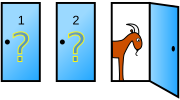More Numbers

For whatever reason, I found myself pondering the Monty Haul Problem again today.
If you're familiar with this problem, stop reading. I only describe it here, I don't add any value. : ) For the rest of you, here's a nickel-tour:
You're on Let's Make a Deal, and Monty shows you three doors. He tells you that behind one door is a new car, and the others have goats. You pick a door, say, Number 1. Without opening the door you picked, Monty opens one of the other doors (say, 3), revealing a goat. Monty then gives you the chance to switch from Door 1 to Door 2. Or you can stick with your guns. Which do you choose?
Most human beings say "stick with 1". But it turns out (counterintuitively) that if you switch doors, you are actually twice as likely to win a car! ...At best, telling this to people not familiar with the problem elicits violence.
Some people are willing to "accept" that they may have gone from a 1/3rd probability of winning to a 1/2 probability. But even that's not true. Switching gives you a 2/3rd chance of winning.
The best explanation I saw of this was using a chart. The math for this is way beyond my ken. But, if you are unconvinced of this, write out a chart representing the possible outcomes:
1 2 3 either 2 or 3
1 2 3 must be 3
1 2 3 must be 2
1 2 3 must be 3
1 2 3 either 1 or 3
1 2 3 must be 1
1 2 3 must be 2
1 2 3 must be 1
1 2 3 either 1 or 2
So, the bold is where the Car is hidden, and the green is where you first picked. If you look at each in turn, the right most column tells you which door Monty can open. So, if you switched, you will lose in only the cases where Monty could open one of two doors (ie: those cases where you chose right the first time). In every other scenario, switching wins. From the standpoint of switching, there are 6 winning scenarios, and 3 losing. ...meaning, you are twice as likely to win!
Humans are not wired for statistics! (At least, I'm not.)

1 comment:
It makes perfect logical sense to me.
Though, to be fair, the first time someone had ever tried to explain it to me, I didn't get it. I think it was cause they left out the bit about the host always having to open a goat-door. It was presented more as "in this example" or "on this occasion" he opens a second door and it shows you a goat.
Lacking that bit of info, I seem to recall arguing pretty strongly that you gained nothing by switching doors, and were, in fact, probably falling into a trap by doing so. While statistics and probability are powerful, they are insignificant compared to the duplicity and selfishness of human nature.
The problem is a bit deceptive in that way. The odds change to favor door switching only if you apply a restriction that is unlikely to apply in the real world.
Regardless, it's still a neat conundrum and a fun math exercise.
Post a Comment